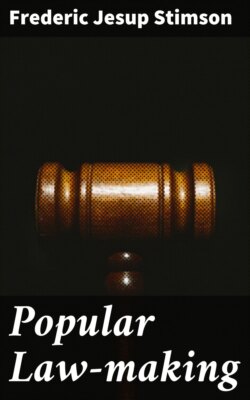Читать книгу Popular Law-making - Frederic Jesup Stimson - Страница 30
На сайте Литреса книга снята с продажи.
A.D. 920. WESSEX. EDWARD.
Оглавление"2. And if a ceorl throve, so that had fully five hides of his own land, church and kitchen, bell-house and burh-gate-seat, and special duty in the king's hall, then was he thenceforth of thegn-right worthy.
"6. And if a merchant throve, so that he fared thrice over the wide sea by his own means, then was he thenceforth of thegn-right worthy."
Worldly success has thus always been the foundation of English nobility.
Then there is a good deal about how much you have to pay for a churl, and how much for an earl, and so on, leaving out only the slaves; for all the free people of England in Saxon times were divided into earls and churls; that is, noblemen and agricultural laborers or yeomanry; these were the two estates besides the church, always a class by itself. Later there grew up the thanes, who were merely large landlords; the law became that a man that had five hides of land, five or six hundred acres, with a farm, should by the mere fact of having that land become a thane, an earl. That method of ennobling a man by land got to be a way, at that time the only way, by which a churl or a villein could become a nobleman or even be emancipated. Exactly as now with our American Indians; when an Indian gets one hundred and sixty acres given to him in severalty he becomes, under the Dawes Act, a citizen of the United States. Later there grew up emancipation by the guilds. The word guild meant the members of a certain handicraft, but that was rather the secondary meaning; it originally meant the freemen of the town. But the freemen of the towns were made up of the freemen of the guilds. No one could become a member of the guild without going through certain ceremonies, much as he would now to join a trades-union; and no one could become a freeman of the town unless he was a freeman of the guild. The law grew to be, however, that if a man succeeded in staying in a town for a year and a day, without being turned out, plying his handicraft, he became by that mere fact a freeman of the town; for the citizens of towns established their liberty, both personal and political, far earlier than the dwellers on agricultural land.
